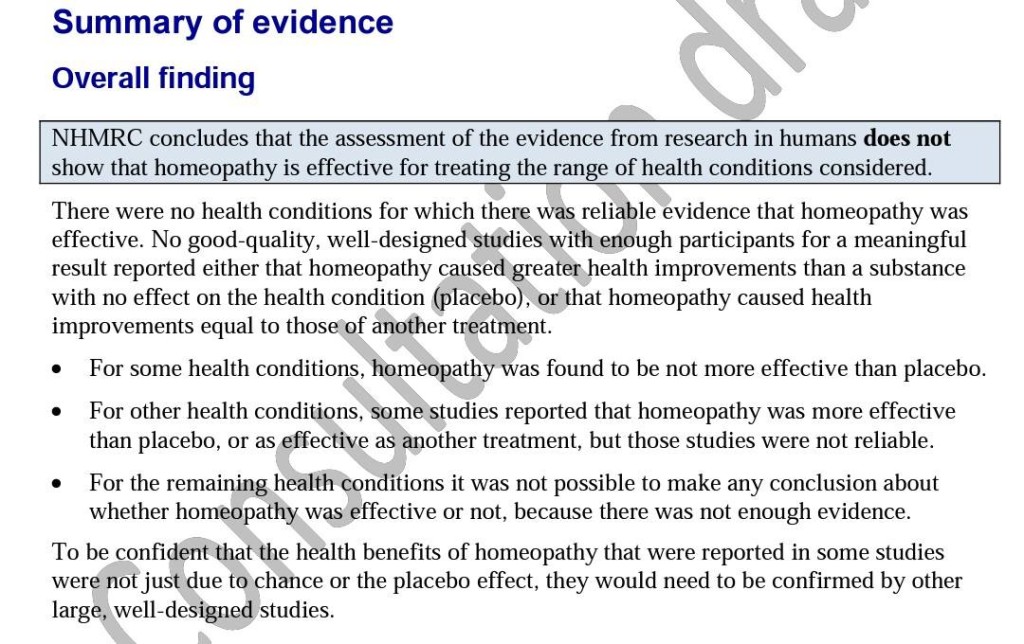Let me drop a bombshell: Homeopathy does not work.
Homeopathy is the process of diluting certain substances in alcohol or distilled water repeatedly until it contains no trace of the original substance, and using the resulting liquid as a medicine to cure various ailments. Current homeopathic theories claim that this process works because of some sort of “water memory” that stores information in the water molecules even after the original substance is gone. Yep, water memory.
Homeopathy is a theory that has been consistently refuted and disproved by medical experts, and although no amount of evidence would sway the beliefs of the die-hard supporters, a new publication by a respected Australian medical research council essentially negates the legitimacy of homeopathic processes. It gives me a little bit of hope that maybe those undecided people sitting on the fence somewhere between homeopathy and science may now have an easier time picking a side.
The NHMRC Publication
The National Health and Medical Research Council chose to review a range of studies regarding various alternative medicines – homeopathy in this case – in an effort to make clear any positive or negative effects from the use of these techniques to cure medical conditions.
By carefully examining and scrutinising existing studies and claimed evidence on the subject of homeopathy, NHMRC was able to conclude which of the studies were committed with a valid, systematic approach and which were based on unreliable or uncontrolled conditions and would therefore not be relevant in any scientific analyses or discussions. They have then taken the remaining valid studies and used them to deduce the effectiveness of homeopathy.
The Results
The results to the study were as most would expect:
There were no health conditions for which there was reliable evidence that homeopathy was effective. No good-quality, well-designed studies with enough participants for a meaningful result reported either that homeopathy caused greater health improvements than a substance with no effect on the health condition (placebo), or that homeopathy caused health improvements equal to those of another treatment.
This study is still open for rebuttal and discussion until May 26th via submission of alternative evidence that credibly demonstrates any positive medicinal effects of homeopathy. But if evidence hasn’t already been presented, it’s unlikely it will be presented now, so I wouldn’t hold your breath (which is also an alternative medicine by the way). We can safely assume these conclusions won’t change before the close date.
Quack, quack!
The entire business of homeopathy, along with most other alternative medicines, thrives on the fact that people are unknowingly susceptible to biased pseudo-evidence.
Although it seems almost counter-intuitive, first-hand accounts by people who have used these remedies and have personally noticed positive results are actually one of the least reliable forms of evidence, simply due to the numerous problems caused by human cognitive biases. These personal accounts do not prove that homeopathy generates a positive medical result at all; instead they simply demonstrate the distortions that placebos and cognitive biases have on our perception of our world and ourselves.
Generally, people who want homeopathic solutions to work will notice positive results whether or not they actually occur. Then there’s the fact that people who try alternative medicines and find good results are more likely to tell people about it than those who try it and find that it has no effect. These situations, multiplied by the millions of people who try homeopathy, generate an overall consensus that it works, but when put to scientific scrutiny we can cut through the biases and see that these practices have no legitimate medical advantage when compared with a simple placebo.
Why We Can’t Just “Let Homeopathy Be”
I often hear alternative medicine sympathisers say “Why can’t we let people use homeopathy if they want to?” and to some degree I understand that point of view – people should have the right to administer alternative medicine to themselves if they believe it works. The problem, however, is the danger that the alternative medicine industry poses to unsuspecting patients looking for a miracle cure.
Millions of people all over the world, ignorant to current scientific consensus and evidence, when facing life-threatening medical conditions turn to alternative medicines such as homeopathy instead of seeking legitimate medical advice from physicians who use proven and reputable techniques, and in doing so put themselves in a dangerous situation without the benefit of modern scientific knowledge to protect them.
Sure, homeopathy gives a sense of security and comfort to those in pain or suffering from basic medical conditions, but at the same time it convinces people to irrationally dismiss proven scientific techniques, often resulting in a decrease in health or even death. This is aside from the fact that unlike mainstream medical industries the alternative medicine industry is mostly unregulated, which can lead to neglectful or unsafe practices by the people and companies creating these remedies. Giving homeopathy the freedom to pass itself off as science makes people think it’s a viable alternative that can solve any medical issue, when no evidence supports this.
At best, it’s unnecessary. At worst, it’s deadly.
Obviously, we can’t force patients to take scientific approaches when making medical choices, but what we can do is spread awareness of this pseudo-scientific non-medicine so when people are deciding where to place their faith, they can make their decision based on solid, scientific evidence rather than hear-say and unverifiable “evidence” that homeopathy relies on.
Don’t forget:
If water has a memory, then homeopathy is full of crap.
Literally. Think about it.
Related
- http://en.wikipedia.org/wiki/Homeopathy
- http://consultations.nhmrc.gov.au/public_consultations/homeopathy_health
- http://consultations.nhmrc.gov.au/files/consultations/drafts/nhmrcdrafthomeopathyinformationpaper140408.pdf
- http://www.iflscience.com/health-and-medicine/meta-study-confirms-homeopathy-doesnt-work

